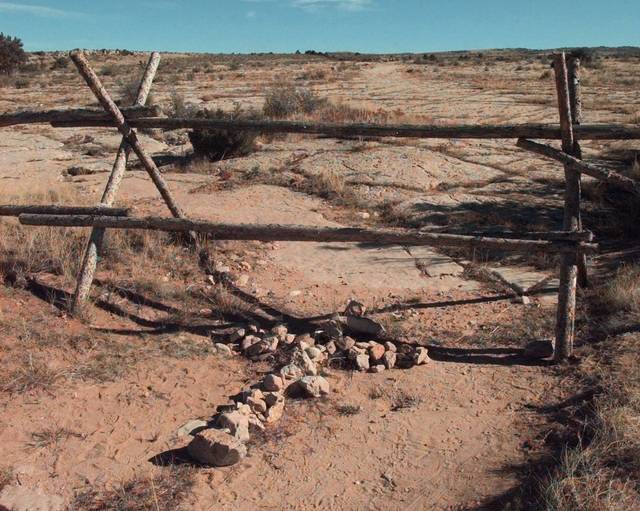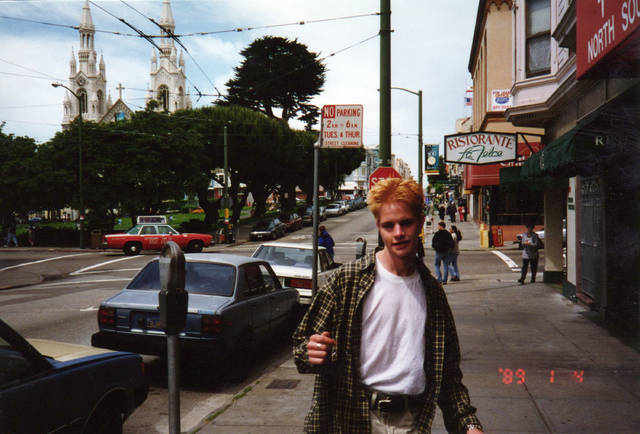Matthew Shepard’s murder still haunts Wyoming after 20 years

This 1995 photo provided by the Matthew Shepard Foundation shows Matthew Shepard. The murder of Shepard, a gay University of Wyoming student, was a watershed moment for gay rights and LGBTQ acceptance in the U.S., so much so that 20 years later the crime remains seared into the national consciousness. (Zeina Barkawi/The Matthew Shepard Foundation via AP)

In this Oct. 9, 1999 file photo, a cross made of stones rests below the fence in Laramie, Wyo. where a year earlier, University of Wyoming student Matthew Shepard was tied and pistol whipped into a coma. He later died. The murder of Shepard was a watershed moment for gay rights and LGBTQ acceptance in the U.S., so much so that 20 years later the crime remains seared into the national consciousness. (AP Photo/Ed Andrieski, File)

This 1989 photo provided by the Matthew Shepard Foundation shows Matthew Shepard in San Francisco. The murder of Shepard, a gay University of Wyoming student, was a watershed moment for gay rights and LGBTQ acceptance in the U.S., so much so that 20 years later the crime remains seared into the national consciousness. (Dennis Shepard/The Matthew Shepard Foundation via AP)
LARAMIE, Wyo. — When two roofing workers beat a young gay man to death in Wyoming in 1998, the gruesome crime quickly reverberated around the U.S. and turned the sandy-haired college student into a powerful symbol of the quest for acceptance and equal rights.
LARAMIE, Wyo. — When two roofing workers beat a young gay man to death in Wyoming in 1998, the gruesome crime quickly reverberated around the U.S. and turned the sandy-haired college student into a powerful symbol of the quest for acceptance and equal rights.
But two decades after Matthew Shepard was bludgeoned, tied to a rail fence and left to die on the cold high prairie, the emotions stirred up by his slaying linger in Wyoming, which still struggles with its tarnished identity and resists changes sought by the LGBTQ community.
“We’re nowhere near done,” said Sara Burlingame, executive director of the Cheyenne-based LGBTQ advocacy group Wyoming Equality. The group’s work today “is the same thing that was there 20 years ago.”
As recently as Tuesday, days before the anniversary of Shepard’s death, about 200 people attended a forum in Laramie questioning the prevailing view that he was murdered because of his sexual orientation. Wyoming Equality protested by holding a dance at a civic center down the street, using the slogan “When They Go Low … We Go Dance.”
The acrimony over Shepard’s legacy runs high here, just as it did when anti-gay and gay-rights protesters squared off at his funeral in Casper. Even now, people associate Laramie with the murder.
“Once people find out I’m from Laramie, Wyoming, they still zero in on this hate crime,” said Trudy McCraken, who spoke at the forum and was Laramie’s mayor at the time of the slaying.
Wyoming remains “deeply defensive” about the idea that Shepard was targeted because he was gay, Burlingame said.
Known as the Equality State, Wyoming got its nickname for being the first to let women vote. Today it has fewer women in its Legislature than any other state and remains hesitant to adopt policies to counter anti-gay bias and violence.
It is among just five states — along with Arkansas, Georgia, Indiana and South Carolina — that have not passed laws focused on crimes motivated by the victim’s identity, such as their sexual orientation. President Barack Obama signed a federal hate crime prevention act named after Shepard in 2009, a law that Shepard’s mother, Judy Shepard, said has been helpful.
Laramie did not pass an ordinance barring discrimination based on sexual orientation or gender identity until 2015. The University of Wyoming created its diversity office only last year.
Attorneys for Wyoming in 2014 argued in defense of the state’s definition of marriage as only between a man and a woman, a case later rendered moot by higher court rulings.
Attitudes against homosexuality persist in Wyoming, but LGTBQ acceptance has advanced, said Jason Marsden, executive director of the Denver-based Matthew Shepard Foundation.
“Twenty years on, it’s a heck of a lot closer to being a place where people can enjoy their lives more or less equally,” said Marsden, who was a newspaper reporter and friend of Shepard’s at the time of his killing.
The convicted killers, Aaron McKinney and Russell Henderson, are each serving two consecutive life sentences.
Henderson, now 41, said the U.S. should have laws that protect everyone, no matter who they are.
“As tragic as it is, and as unfortunate as it is, and as hard as it is for Matthew’s family, and for my family, for all of us, to go through, it opened up all of us to be better people and really think about who we are,” Henderson said of Shepard’s death in a prison interview Tuesday with The Associated Press.
Still, he insisted, neither he nor McKinney was motivated by anti-gay hatred when they offered Shepard a ride home from a bar. Instead, he said, they were out to rob him of money and possibly drugs when they drove him to the edge of town on the night of Oct. 6, 1998.
He described himself as a follower of others, including the more charismatic McKinney, and was afraid to lose face by doing more to prevent the crime or just going home.
As Henderson drove, McKinney began pistol-whipping Shepard and took his wallet. Henderson tied Shepard to the fence after McKinney told him to do it, he said. Then they left Shepard in the frigid darkness.
The next day, a mountain biker found him. He died less than a week later, on Oct. 12, 1998, at age 21.
Henderson’s remarks don’t change the facts of the case, which include McKinney’s confession to police, Marsden said.
McKinney repeatedly used homosexual slurs in his confession, Marsden said. McKinney’s lawyers also wanted to argue that Shepard caused McKinney to explode in a rage by putting his hand on McKinney’s leg. The judge prohibited the “gay panic” defense.
Because of overcrowding at Wyoming’s maximum-security prison in Rawlins, Henderson and McKinney have served their time in multiple states. McKinney is now in a Mississippi prison and not agreeing to interview requests, according to the Wyoming Department of Corrections.
Henderson, who pleaded guilty to avoid a possible death sentence, is serving his time at a medium-security prison in Torrington, a quiet farming-and-ranching town a few miles from the Nebraska line. He helps imprisoned hospice patients and trains shelter dogs so they can be adopted.
“I think about Matthew every single day of my life. I think about him and every single one of those days that I’ve had that he hasn’t had, his family hasn’t had, his friends haven’t had. I’m so, so ashamed I was ever part of this,” Henderson said.
One gay rights activist argues that Henderson has paid his dues for what he described as being “in the wrong place at the wrong time.”
“I think he has atoned. I think he has a contribution to make to society,” said Malcolm Lazin, executive director of the Philadelphia-based LGBT group Equality Forum and a former federal prosecutor.
Marsden pointed out that only Wyoming’s governor could commute Henderson’s sentence, a prospect that he called “super unlikely.” Burlingame of the Wyoming Equality group said she believes in redemption but doubts Henderson has really atoned for the crime.
She said her organization will continue its “unapologetic advocacy,” reaching out to churches, businesses, legislators and regular citizens about their policies and attitudes.
“For the last 20 years, the work of Wyoming Equality has really been this race, that we want to get to every LGBT person out there,” Burlingame said. “But we’re also trying to get to the next Aarons and the next Russells.”
———
Associated Press writers Brady McCombs in Laramie and David Crary in New York contributed to this report.
———
Follow Mead Gruver at https://twitter.com/meadgruver

